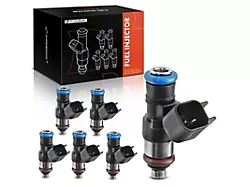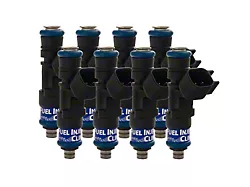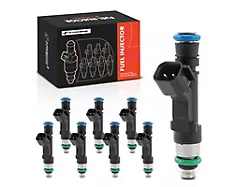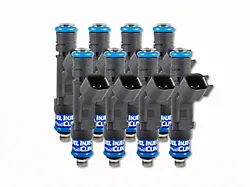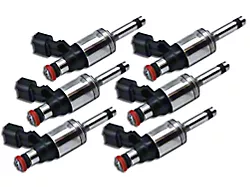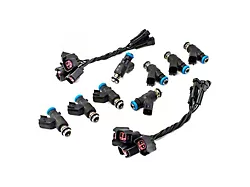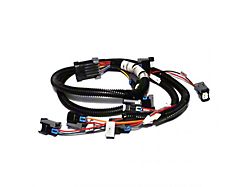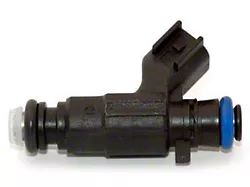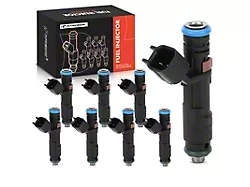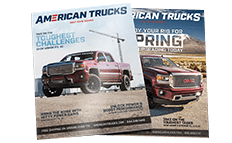What are Sierra Fuel Delivery Parts & How Do They Work?
Sierra fuel delivery parts include:
- Fuel injectors
- Fuel lines
- Fuel filter
- Fuel pump
- Gas tank
When you fill up at the pump, you put gas into your gas tank. When you hit the gas pedal, the fuel pump sends gas through the fuel lines, up to injectors. Once fuel reaches the injectors, it then gets thrown into the engine where it mixes with air and a spark of electricity, creating combustion. The measurement for the amount of fuel that can be delivered is typically measured in CCs (cubic centimeters).
Benefits Of Upgrading Your Sierra’s Fuel Delivery Parts
Swapping out the stock Sierra fuel delivery parts for aftermarket ones will net you some considerable performance gains. Benefits of upgrading your Sierra fuel system include:
- Enhanced acceleration
- Quicker throttle response
- Improved driveability
Supplying your Sierra with more fuel will make it quicker, providing it with a hearty increase in power. Horsepower gains can range anywhere from 20 HP to 75 HP depending upon other supporting modifications as well as what you are specifically upgrading. Typically, out of all the parts in your Sierra’s fuel system you can upgrade, the only one that will deliver significant power is the fuel injectors.
When Should I Upgrade My Sierra’s Fuel System?
There is no set answer for this and it will depend upon a few factors, such as your current modifications, your plans for future upgrades, and how your Sierra is currently driving (especially when accelerating). If you have modified your Sierra’s engine heavily, then you will want to upgrade the fuel system. This is especially true for any power adder (forced induction) such as a supercharger or turbocharger.
When you go the forced induction route with your Sierra, an upgraded and more robust fuel system becomes an essential modification. Pumping all that extra air into your engine will require you to throw in more fuel. Without extra fuel, the engine will be starving in the mid-range and top end RPMs.
If you just aren’t quite there yet with your build but plan on adding more soon, then you should consider upgrading the fuel system to support your future mods either beforehand or at the same time.
If your Sierra is feeling sluggish or like it isn’t accelerating as well, it may be due to a faltering fuel system. If you have the means and the knowledge to check your fuel injectors yourself, then remove them and check them and see if they are clogged. If this is above your skill level, then take your Sierra to your mechanic or the dealership to have it checked.
How Hard is it to Upgrade Your Sierra’s Fuel System?
Depending upon what you are upgrading, the installation process can range from moderately easy to fairly difficult. Replacing items such as the fuel pump, fuel lines, or gas tank can be fairly difficult as you will be required to work in some tight spaces, need a selection of tools, and some confidence in what you are doing.
If you are upgrading your fuel filter or fuel injectors, you’re in for a moderately easy upgrade most enthusiasts can knock out. Swapping out the filter or injectors can be done with some basic hand tools and 30 minutes to an hour of your time.
GMC Sierra Fuel Injectors Explained
Fuel injectors are the main/major component of your Sierra’s fuel system; replacing them will make the biggest difference in your truck’s performance. A set of larger fuel injectors will flow a greater volume of fuel into your engine, providing it with extra power. Fuel injector flow rates are measured in CC’s/per hour; however, some fuel injectors are measured by lbs/per hour. There is no difference other than how different brands choose to represent their stats.
Unless you have a bunch of extra power modifications on your engine, going to a larger injector size will actually hurt your truck's performance. There has to be a need for the extra fuel, otherwise, that extra fuel will not be utilized and end up just being a waste.
If your fuel injector performance is off, you can clean them with fuel system cleaner or manually by hand. Typically, most auto part store cleaners will do the trick of knocking off the gunk and build-up clogging your injectors.
Do I Need to Tune My Sierra if I Modify the Fuel System?
More than likely, you will not need to tune your Sierra if you are upgrading the fuel system unless you are going to a larger set of fuel lines or a larger set of fuel injectors. Larger fuel injectors or lines on your Sierra will require you to a get tune for your truck.
The reason for needing a tune is with all of that extra fuel coming into the engine, you’ll want to recalibrate the computer to accommodate for this increase in fuel, optimizing power, performance, and driveability.
Sierra Fuel System Maintenance Explained
Maintaining your Sierra’s fuel system is a lot easier than you think. About every 50,000 miles you will want to clean the fuel injectors with some sort of fuel system cleaner. Every 100,000 – 150,000 miles you will want to replace the fuel injectors. You will want to replace the fuel filter every 75,000 miles. Replacing the gas tank, fuel lines, or fuel pump is really only necessary if they have been damaged or corroded, otherwise they typically don’t need to be replaced.
Shop All Performance Parts for Trucks
Fitment Includes:
- 1999, 2000, 2001, 2002, 2003, 2004, 2005, 2006, 2007, 2008, 2009, 2010, 2011, 2012, 2013, 2014, 2015, 2016, 2017, 2018, 2019, 2020, 2021, 2022, 2023 and 2024 Sierras
- Base, C3, Classic, HT, Hybrid, Nevada Edition, SL, Z71, Denali, SLE, 1500, SLT and WT Sierras
- Engines: 4.3L Vortec V6, 4.8L Vortec V8, 5.3L Vortec V8, 5.3L Flex-Fuel Vortec V8, 5.3L Vortec V8 Hybrid, 6.0L Vortec V8, 6.2L VVT Vortec V8, 4.3L EcoTec3 V6, 5.3L EcoTec3 V8, 6.2L EcoTec3 V8 Sierras
*Please see Sierra parts pages for any exceptions.
